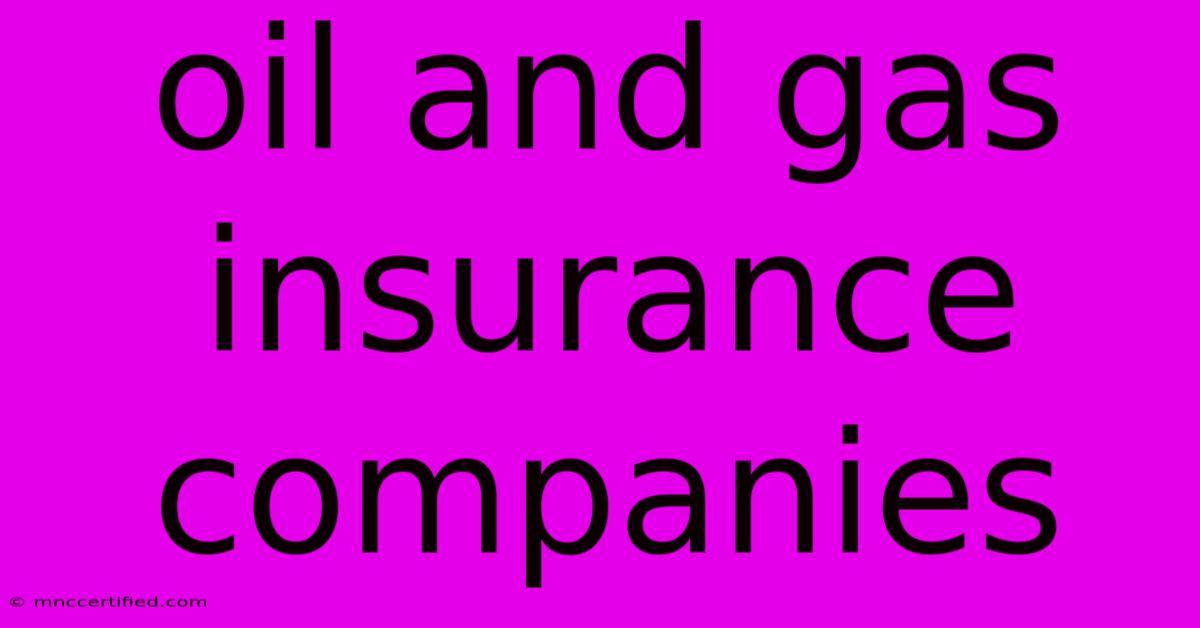Oil And Gas Insurance Companies

Table of Contents
Oil and Gas Insurance Companies: A Comprehensive Guide
The oil and gas industry is inherently risky. From volatile energy prices to the complex machinery and hazardous materials involved, the potential for significant financial losses is ever-present. This is where specialized oil and gas insurance companies step in, providing crucial risk mitigation and financial protection for companies of all sizes. This guide will explore the vital role these insurers play, the types of coverage they offer, and what to consider when choosing the right provider.
Understanding the Risks in the Oil and Gas Sector
Before delving into the specifics of insurance, it's important to understand the multifaceted risks faced by oil and gas companies. These include:
-
Operational Risks: This encompasses accidents, equipment failures, spills, explosions, and fires, all of which can lead to substantial property damage, environmental liabilities, and business interruption. Examples: offshore platform accidents, pipeline leaks, refinery incidents.
-
Financial Risks: Fluctuations in oil and gas prices, project delays, and contract disputes can severely impact profitability and financial stability. Examples: hedging failures, cost overruns, market volatility.
-
Liability Risks: The industry faces potential lawsuits related to environmental damage, bodily injury, and property damage. Examples: third-party claims for pollution, worker compensation claims, product liability lawsuits.
-
Political and Regulatory Risks: Changes in government regulations, political instability in operating regions, and sanctions can create unforeseen challenges. Examples: permit delays, changes in environmental laws, nationalization of assets.
Types of Insurance Offered by Oil and Gas Insurance Companies
Oil and gas insurance is highly specialized, offering a range of coverages tailored to the industry's unique risks. Key types of insurance include:
-
Property Insurance: Protects physical assets such as drilling rigs, pipelines, refineries, and processing plants against damage or loss from various perils, including fire, explosion, and natural disasters.
-
Liability Insurance: Covers claims for bodily injury, property damage, and environmental contamination caused by the insured's operations. This often includes Pollution Liability Insurance, a critical coverage given the environmental sensitivities of the industry.
-
Business Interruption Insurance: Compensates for lost income and expenses resulting from operational disruptions caused by insured events.
-
Workers' Compensation Insurance: Provides benefits to employees injured on the job, covering medical expenses and lost wages.
-
Marine Insurance: Crucial for offshore operations, covering vessels, equipment, and cargo involved in transportation and exploration.
-
Professional Liability Insurance (Errors & Omissions): Protects against claims arising from professional negligence or mistakes in engineering, design, or other professional services.
Choosing the Right Oil and Gas Insurance Company
Selecting the right insurer is crucial for effective risk management. Consider these factors:
-
Financial Strength and Stability: Choose a company with a strong financial rating to ensure they can meet their obligations in the event of a major claim.
-
Industry Expertise: Opt for an insurer with proven experience and a deep understanding of the oil and gas industry's unique risks.
-
Coverage Breadth and Depth: Ensure the policy adequately addresses all potential risks faced by your operations.
-
Claims Handling Process: Investigate the insurer's reputation for prompt and fair claim settlements.
-
Premium Cost and Value: Balance the cost of the premium with the level of coverage and service provided.
Off-Page SEO Considerations for this Article
To improve the search engine ranking of this article, consider the following off-page strategies:
-
Backlinks: Reach out to relevant websites (oil and gas industry blogs, news sites, etc.) and try to secure backlinks to this article. This establishes your article as a credible source of information.
-
Social Media Promotion: Share the article on relevant social media platforms to increase visibility and drive traffic.
-
Industry Participation: Participate in industry forums and discussions, subtly linking back to the article where appropriate.
By understanding the risks, available coverages, and selection criteria, oil and gas companies can effectively mitigate their exposure and protect their financial stability. Selecting the right insurance partner is a critical element of responsible and successful operations within this dynamic and challenging sector.

Thank you for visiting our website wich cover about Oil And Gas Insurance Companies. We hope the information provided has been useful to you. Feel free to contact us if you have any questions or need further assistance. See you next time and dont miss to bookmark.
Featured Posts
-
U Mass Vs Georgia Live Stream And Tv
Nov 24, 2024
-
Wisconsin Vs Nebraska Live Score Updates
Nov 24, 2024
-
Arnold Insurance Cape Girardeau
Nov 24, 2024
-
Business Liability Insurance Ct
Nov 24, 2024
-
Arsenal Vs Forest 3 0 Victory Report
Nov 24, 2024